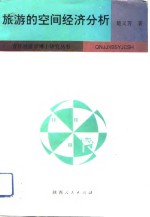

旅游的空间经济分析PDF电子书下载
- 电子书积分:11 积分如何计算积分?
- 作 者:楚义芳著
- 出 版 社:西安:陕西人民出版社
- 出版年份:1992
- ISBN:7224026131
- 页数:261 页
Abstract 1
前言页 1
Preface Bao Jue-Min He Zhi-Qiang 1
1.Introduction 1
1.绪论 1
序 鲍觉民 何自强 1
内容提要 1
1.1.Progress in spatial economic studies for tourism 2
1.1.1.Notions and concepts 2
1.1.旅游的空间经济研究进展 2
1.1.1.基本概念 2
1.1.2.Themes of study 4
1.1.2.旅游的空间经济研究主题 4
1.1.3.Progress at home and abroad 5
1.1.3.国内外研究进展 5
1.2.1.Methodology in general 8
1.2.旅游空间经济分析的方法论 8
1.2.1.一般研究方法 8
1.2.Methodology 8
1.2.2.Methods of spatial analysis for tourism 9
1.2.2.旅游的空间分析方法 9
1.2.3.Sources of research material 13
1.2.3.材料来源 13
2.旅游地开发评价 15
2.Evaluating Tourist Areas for Development 15
2.1.1.基本概念和理论基础 16
2.1.问题和研究进展 16
2.1.1.Concepts and theoretical bases 16
2.1.Problems and research progress 16
2.1.2.Research progress home and abroad 20
2.1.2.国内外研究进展 20
2.2.1.Basic model and evaluation standing points 22
2.2.Evaluation methods 22
2.2.1.基本模型和价值标准 22
2.2.评价方法 22
2.2.2.特尔菲法 26
2.2.2.Delphi method 26
2.2.3.Analytic Hierarchy Process 29
2.2.3.层次分析法 29
2.3.1.General model 37
2.3.1.评价总模型 37
2.3.General model of evaluating tourist areas 37
2.3.旅游地评价总模型 37
2.3.2.A comparison among various models 39
2.3.2.各种模型及因子权重的比较 39
2.3.3.A discussion on the general model 43
2.3.3.关于总模型的讨论 43
3.1.1.旅游资源和旅游地的分类 46
3.1.1.Classification of tourist resources and tourist areas 46
3.1.Relationship between tourist resources and activities 46
3.Evaluating Tourist Resources 46
3.旅游资源评价 46
3.1.旅游资源与旅游活动 46
3.1.2.Liniages between tourist activities and resource factors 50
3.1.2.旅游资源因子与旅游活动的关联 50
3.2.Models for the evaluation of tourist resources in China 51
3.2.中国旅游资源评价模型 51
3.2.1.旅游资源评价中间模型 51
3.2.1.Intermediate models 51
3.2.2.Model group 54
3.2.2.旅游资源评价子模型 54
3.2.3.Concluding models 61
3.2.3.旅游资源评价模型 61
3.3.Evaluating the factors of tourist resources 64
3.3.1.General discussion 64
3.3.1.关于因子评分 64
3.3.旅游资源因子分级评价 64
3.3.2.Evaluating the quality of tourist resources 65
3.3.2.旅游资源因子质量的分级评价 65
3.3.3.Evaluating the dimension of tourist resources 69
3.3.3.旅游资源因子规模的分级评价 69
4.1.1.Factors for the evaluation of regional conditions 72
4.1.Model for the evaluation of regional conditions of tourist areas in China 72
4.Evaluating Regional Conditions and Locational Characteristics 72
4.旅游地区域条件和区位特性评价 72
4.1.中国旅游地区域条件评价模型 72
4.1.1.区域条件评价因子 72
4.1.2.区域条件评价模型 75
4.1.2.Model for the evaluation of regional conditions 75
4.1.3.Evaluating the factors of regional conditions 76
4.1.3.区域条件因子分级评价 76
4.2.1.区位特性及其对客流的影响 78
4.2.Model for the evaluation of locational characteristics of tourist areas in China 78
4.2.1.Impact of locational characteristics to tourist flow 78
4.2.中国旅游地的区位特性评价 78
4.2.2.区位特性评价模型 82
4.2.2.Model for the evaluation of locational characteristics 82
4.2.3.Evaluating the factors of locational features 84
4.2.3.区位特性因子分级评价 84
5.1.旅游地评价模型及其应用 88
5.1.1.Concluding models for evaluating tourist areas 88
5.System for the Evaluation of Tourist Areas in China and Its Application 88
5.中国旅游地评价系统及其实用 88
5.1.Models for the evaluation of tourist areas and the application 88
5.1.1.旅游地评价终因子模型 88
5.1.2.评价实例 90
5.1.2.Evaluation case study 90
5.2.关于旅游地评价系统的讨论 92
5.2.1.评价模型的适用范围 92
5.2.1.Application dimensions of the system 92
5.2.Discussion on the evaluation system 92
5.2.2.评价结果的动态特性 94
5.2.2.Changable evaluation results 94
5.2.3.评价系统的实用 95
5.2.4.Scientific fuctions of the system 95
5.2.3.Further application of the system 95
5.2.4.评价的科学功能 95
5.2.5.评价的主观与客观性 96
5.2.5.Objectivity of the system 96
6.1.研究进展概述 99
6.1.1.国外研究进展 99
6.旅游容量理论研究 99
6.Theoretical Approach to Tourist Carrying Capacities 99
6.1.Progress in tourist capacity study 99
6.1.1.Research progress abroad 99
6.1.2.国内研究进展 101
6.1.2.Progress at home 101
6.2.1.旅游容量的定义 103
6.2.Focal points of tourist capacities 103
6.2.1.Defining tourist capacities 103
6.2.旅游容量问题的焦点 103
6.2.2.Possibility of measurement 104
6.2.2.旅游容量确定值存在的可能性 104
6.2.3.Trend for common use 106
6.2.3.旅游容量标准的普适性问题 106
6.2.4.Changes on temporal and spatial dimensions 107
6.2.4.旅游容量的变化特性 107
6.3.1.旅游容量是一个概念体系 108
6.3.旅游容量的概念体系 108
6.3.1.System of the concepts of tourist capacities 108
6.3.Concepts of tourist capacities 108
6.3.2.基本容量 109
6.3.2.Basic capacities 109
6.3.3.Non-basic capacities 111
6.3.3.非基本容量 111
7.旅游容量的量测及其应用 114
7.Measurement of Tourist Capacities and the Application 114
7.1.旅游容量的量测 115
7.1.1.旅游资源容量和旅游感知容量 115
7.1.1.Resource capacity and perceptual capacity 115
7.1.Measurement of tourist capacities 115
7.1.2.生态容量 125
7.1.2.Ecological capacity 125
7.1.3.经济发展容量 127
7.1.3.Development capacity 127
7.1.4.旅游地容量 132
7.1.4.Resort capacity 132
7.2.旅游地开发规模和旅游地域比较 135
7.2.Limits for development and comparison of tourist areas 135
7.2.1.Limits of tourist areas for development 135
7.2.1.旅游地开发的极限规模 135
7.2.2.Comparison among tourist areas 139
7.2.2.旅游地域之间的比较 139
7.3.Overloading, tourism pollution and the control 142
7.3.1.超载与旅游污染 142
7.3.1.Overloading and tourism pollution 142
7.3.超载、旅游污染及其控制 142
7.3.2.消除污染与控制旅游流强度 147
7.3.2.Relations between pollution delimination and direction of tourist flows 147
8.1.Nature of tourism 151
8.国际旅游的创汇效应 151
8.1.旅游的性质 151
8.1.1.旅游的经济特征 151
8.Foreign Exchange Earning from International Tourism 151
8.1.1.Economic features of tourism 151
8.1.2.Comparative advantage and limits of tourism 153
8.1.2.旅游的比较优势和局限 153
8.1.3.Positiveness and negativeness of the economic impact of tourism 155
8.1.3.旅游对经济影响的两面性 155
8.2.Importance of tourism as a foreign exchange source 157
8.2.1.Foreign exchange earnings from tourism and export 157
8.2.旅游作为外汇来源的重要性 157
8.2.1.旅游外汇收入与出口外汇收入 157
8.2.2.旅游创汇在贸易中的位次 161
8.2.2.Ranking of tourism as an export 161
8.2.3.Costs for earning foreign exchange and the propensity to import 164
8.2.3.换汇成本和进口倾向之比较 164
8.3.Leakage and net foreign exchange earning 169
8.3.1.Tourist expenditure and foreign exchange earning in name 169
8.3.1.实际旅游花费和名义旅游外汇收入 169
8.3.漏损和旅游净外汇收入 169
8.3.2.漏损及其发生 172
8.3.2.Leakage 172
8.3.3.净旅游收汇与平衡对外收支 177
8.3.3.Balancing foreign exchange account 177
8.3.4.漏损的国际比较 178
8.3.4.An international comparison of leakage 178
9.旅游对经济发展的影响 181
9.Economic Impact of Tourism 181
9.1.1.旅游对于经济影响的程度 182
9.1.旅游与宏观经济的发展 182
9.1.Tourism and the development of macroeconomy 182
9.1.1.Degree of tourism s economic impact 182
9.1.2.Contribution of tourism to the GNP growth 185
9.1.2.旅游与国民生产总值的增长 185
9.1.3.产业发展优势比较 188
9.1.3.A comparison of comparative advantages 188
9.2.旅游的乘数效应 193
9.2.Multilier effect of tourism 193
9.2.1.Multiplier effect 193
9.2.1.乘数效应 193
9.2.2.Linkage of tourism with other industries 198
9.2.2.旅游与其它产业的关联 198
9.2.3.Output multiplier of tourism 203
9.2.3.旅游的产出乘数 203
9.3.Income effect of tourism 207
9.3.1.Tourism and the growth of national income 207
9.3.1.旅游与国民收入的增长 207
9.3.旅游的收入效应 207
9.3.2.直接与间接收入效应的比较 209
9.3.2.Direct and indirect income effect of tourism 209
9.3.3.Income multiplier 212
9.3.3.收入乘数 212
9.4.Factor intensity and employment effect of tourism 216
9.4.1.Factor intensity of tourism 216
9.4.1.旅游的要素密集性 216
9.4.旅游的要素密集性和就业效应 216
9.4.2.Employment effect of tourism 222
9.4.2.旅游的就业效应 222
Appendices 229
附录 229
附录1.特尔裴问卷表及征纳结果统计 229
附录2.求取旅游地评价因子权重值的计算机程序 235
附录3.美国内政部土地管理局拟定的土地供游憩活动适宜度分级评估系统 238
附录4.海水浴场建设之指标 248
主要参考文献 250
Postscript 251
作者后记 261
References 261
- 《水面舰艇编队作战运筹分析》谭安胜著 2009
- 《红色旅游的社会效应研究》吴春焕著 2019
- 《近代旅游指南汇刊二编 16》王强主编 2017
- 《分析化学》陈怀侠主编 2019
- 《信息系统安全技术管理策略 信息安全经济学视角》赵柳榕著 2020
- 《近代旅游指南汇刊 31》王强主编 2014
- 《近代旅游指南汇刊二编 10》王强主编 2017
- 《影响葡萄和葡萄酒中酚类特征的因素分析》朱磊 2019
- 《仪器分析技术 第2版》曹国庆 2018
- 《近代旅游指南汇刊 13》王强主编 2014
- 《办好人民满意的教育 全国教育满意度调查报告》(中国)中国教育科学研究院 2019
- 《陕西民歌金曲30首:五线谱版》赵季平,冯健雪,黎琦编著 2019
- 《人民院士》吴娜著 2019
- 《西安鼓乐图鉴》(中国)乔建中 2019
- 《中国人民的心》杨朔著;夕琳编 2019
- 《中华人民共和国成立70周年优秀文学作品精选 短篇小说卷 上 全2册》贺邵俊主编 2019
- 《中华人民共和国成立70周年优秀文学作品精选 中篇小说卷 下 全3册》洪治纲主编 2019
- 《中华人民共和国药典中成药薄层色谱彩色图集》(中国)国家药典委员会 2019
- 《北京人民艺术剧院剧本系列 白露》刘国华,马鹏程 2019
- 《中华人民共和国成立70周年优秀文学作品精选 中篇小说卷 上 全3册》洪治纲主编 2019
